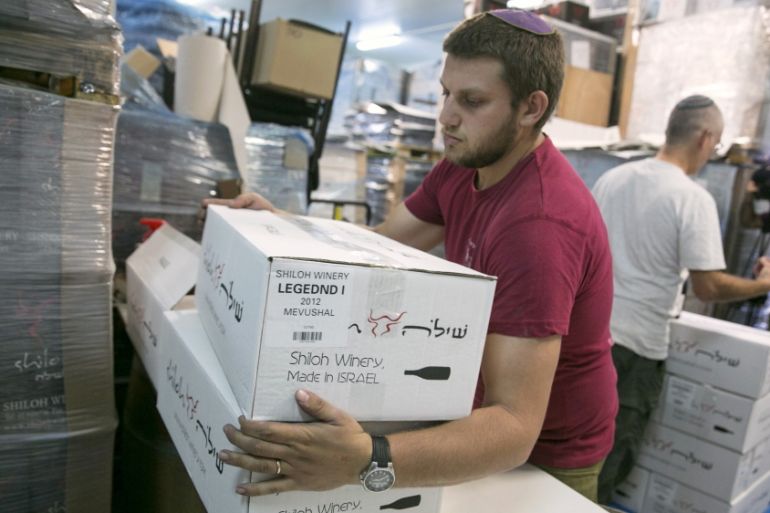Ruling on West Bank settlement wines stirs debate
Canada’s food inspection agency will continue labelling wines made in illegal settlements as “Products of Israel”.

A flip-flop by Canada’s federal food inspection agency has brought to the forefront controversy surrounding the country’s labelling of Israeli products made in illegal West Bank settlements.
Last week, the Canadian Food Inspection Agency (CFIA) reversed a decision – made less than 24 hours earlier – that wines made in two West Bank settlements and sold in Canada could no longer be labeled “Product of Israel” because the grapes were grown, fermented and processed outside of the country’s internationally recognised borders.
On July 13, the agency said it regretted that directive, which led the Liquor Control Board of Ontario (LCBO) to ask sacramental wine vendors to discontinue importing and selling wines made in the settlements of Shilo and Psagot, located in the northern West Bank and near Ramallah. Sacramental wine vendors sell wine used in religious ceremonies.
The initial decision to change the labels on the settlement wines was prompted by a complaint lodged in January by David Kattenburg, a 62-year-old Winnipeg resident and the son of Holocaust survivors. In a subsequent complaint to the CFIA in March, Kattenburg noted that the wineries were operating outside of Israel and using grapes grown in the West Bank.
READ MORE: How are Palestinians resisting Israel’s settlement law?
“To label these wines as Israeli in origin flagrantly violates CFIA regulations, and compromises the trust Canadian consumers have in product origin labelling,” Kattenburg wrote, calling for more accurate labelling that would include a reference to the occupied Palestinian territories.
The inspection agency initially agreed, but quickly backtracked on the decision as outrage grew among pro-Israel advocacy groups and politicians.
Officially, the agency attributed its turnaround to the Canada-Israel Free Trade Agreement (CIFTA), adding that it would work with the liquor board to correct its original directive.
|
|
“Further clarification of the CIFTA indicates that these wines adhere to the agreement and therefore we can confirm that the products in question can be sold as currently labelled,” the agency said in a statement.
The food inspection agency cited a CIFTA provision that considers Israel “the territory where its customs laws are applied”, as opposed to its formal borders. By adhering to the bilateral trade agreement, the agency bypassed the issue of where the grapes were grown.
“What shocks me is that the Canadian government is saying that the trade deal trumps Canadian domestic law and regulation, specifically in the area of food labelling,” Kattenburg told Al Jazeera, noting that neither the CFIA nor the LCBO notified him of their initial or subsequent decisions.
Dimitri Lascaris, an Ontario-based lawyer representing Kattenburg, called the reversal an “intellectually dishonest” attempt at silencing legitimate criticism of Israel.
“When Canadian consumers go into wine stores, they don’t know – because of the false labelling – that they are potentially enabling people to profit from a war crime,” Lascaris told Al Jazeera.
He said the government’s resorting to the free trade agreement “provide[s] a legal pretext for a decision that is political”.
In a statement to Al Jazeera, the CFIA said it “regrets the outcome” of the initial decision, noting: “It resulted from a technical assessment of country of origin labelling that was based on incomplete information, and did not fully consider the Canada-Israel Free Trade Agreement.”
OPINION: Canada – Is it still ‘good for the Jews’?
The free trade agreement, signed in 1996, was updated in 2014 under former Prime Minister Stephen Harper, a staunch Israel ally. Since its expansion, trade between Israel and Canada has tripled to $1.6bn.
When the initial directive made by the CFIA became public, owners of both of the affected settlement wineries lashed out at the Canadian government on social media, with one describing the decision as an attempt to crush Jewish heritage.
In a Facebook post, Psagot Winery owner Yaakov Berg said he was “shocked at the blatant distortion of history on behalf of the Canadian government” and slammed Canada as “a country with no roots or historical validity of its existence there”.

Shiloh Winery said the decision was “absurd“, pointing out that the LCBO’s fine wine and premium spirits business unit had promoted one of their red wines in its May 2016 catalogue.
Wineries operating in Israeli settlements have witnessed a boom in growth since the early 2000s, thriving on government benefits, such as allocated subsidised water quotas, and funds from various ministries.
According to a 2011 report by Who Profits – a project that researches entities that benefit commercially from Israel’s occupation of Arab territory – there are at least 29 wineries in the West Bank, each with several vineyards.
“The expansion of the settler vineyard industry in the West Bank has been even faster. In some areas, dozens of new vineyards have sprung up, seemingly overnight,” the report said.
Settlers in both the West Bank and the Golan Heights have also used their wineries to promote tourism, gain an extra source of income and “operate to normalise … the entire settlement enterprise”, according to the report.
INTERACTIVE: Building the occupation
Kattenburg and Lascaris have accused pro-Israel lobby groups like B’nai Brith Canada of campaigning against the original labelling decision. The group’s chief executive officer, Michael Mostyn, had called it a “disturbing and discriminatory decision”, before saying he expected the CFIA ruling to be corrected “in short order”.
B’nai Brith also praised the efforts of federal parliament member Michael Levitt, who said he was “shocked and deeply concerned” by the directive, which was “at odds” with Canada’s warm ties with Israel.
Kattenburg and Lascaris said they planned to take legal measures against the retraction to ensure consumers would be fully informed of where their products come from.
“These false labels are preventing Canadian consumers from acting according to their conscience, and that is a violation of the law,” Lascaris said.